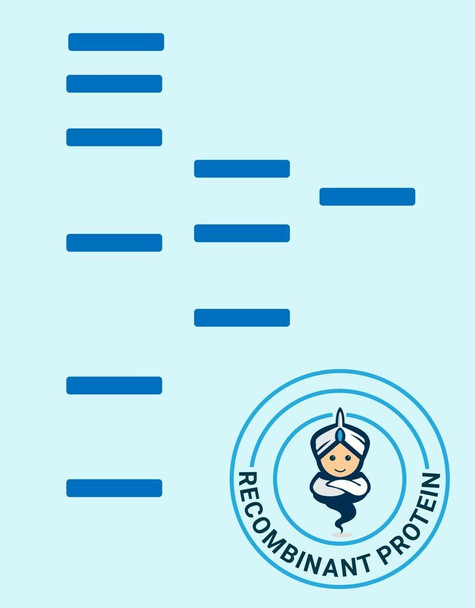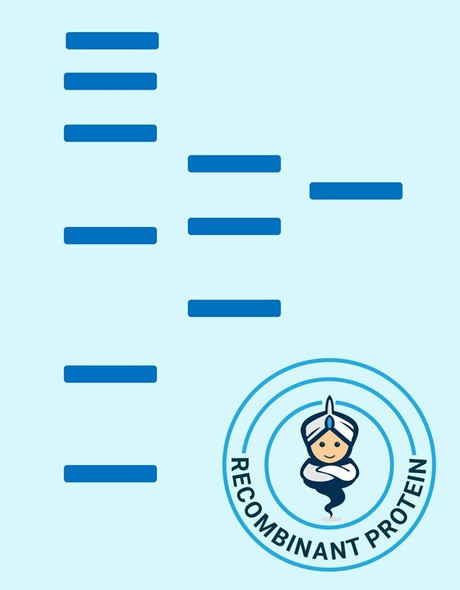Human SOD His Recombinant Protein (RPPB4772)
- SKU:
- RPPB4772
- Product type:
- Recombinant Protein
- Size:
- 100ug
- Species:
- Human
- Target:
- SOD His
- Synonyms:
- Superoxide dismutase [Cu-Zn]
- EC 11511
- SOD1
- SOD
- Source:
- Escherichia Coli
- Uniprot:
- P00441
Description
| Product Name: | Human SOD His Recombinant Protein |
| Product Code: | RPPB4772 |
| Size: | 100µg |
| Species: | Human |
| Target: | SOD His |
| Synonyms: | Superoxide dismutase [Cu-Zn], EC 1.15.1.1, SOD1, SOD, ALS, ALS1, IPOA. |
| Source: | Escherichia Coli |
| Physical Appearance: | Sterile Filtered White lyophilized (freeze-dried) powder. |
| Formulation: | Lyophilized from a 0.2um filtered concentrated solution in PBS, pH 7.4. |
| Solubility: | It is recommended to reconstitute the lyophilized SOD in sterile 18M?-cm H2O not less than 100µg/ml, which can then be further diluted to other aqueous solutions. |
| Stability: | Lyophilized SOD Human although stable at room temperature for 3 weeks, should be stored desiccated below -18°C. Upon reconstitution SOD Human should be stored at 4°C between 2-7 days and for future use below -18°C.Please prevent freeze-thaw cycles. |
| Purity: | Greater than 95.0% as determined by SDS-PAGE and HPLC analyses. |
| Amino Acid Sequence: | MGHHHHHHHH HHSSGHIEGR HMTYARAAAR QARALEATKA VCVLKGDGPV QGIINFEQKE SNGPVKVWGS IKGLTEGLHG FHVHEFGDNT AGCTSAGPHF NPLSRKHGGP KDEERHVGDL GNVTADKDGV ADVSIEDSVI SLSGDHCIIG RTLVVHEKAD DLGKGGNEES TKTGNAGSRL ACGVIGIAQ |
| Biological Activity: | Fully biologically active when compared to standard. The specific activity was tested by Pyrogallic Acid method and was found to be more than 10,000Units/mg. |
Human Cu/Zn Superoxide Dismutase (SOD1) catalyzes the reaction between superoxide anions and hydrogen to yield molecular oxygen and hydrogen peroxide. The enzyme protects the cell against dangerous levels of superoxide. SOD1 binds copper and zinc ions and is 1 of 3 isozymes accountable for destroying free superoxide radicals in the body. The encoded protein neutralizes supercharged oxygen molecules, which can damage cells if their levels are not controlled. Mutations in SOD1 cause a form of familial amyotrophic lateral sclerosis.
SOD Human Recombinant produced in E.Coli is a single, non-glycosylated, polypeptide chain containing 189 amino acids with a 10 × His at N-terminus and having a molecular mass of 40.0kDa.The SOD Human is purified by proprietary chromatographic techniques.
| UniProt Protein Function: | SOD1: Destroys radicals which are normally produced within the cells and which are toxic to biological systems. Homodimer; non-disulfide linked. Homodimerization may take place via the ditryptophan cross-link at Trp-33. The pathogenic variants ALS1 Arg-38, Arg-47, Arg-86 and Ala-94 interact with RNF19A, whereas wild-type protein does not. The pathogenic variants ALS1 Arg-86 and Ala-94 interact with MARCH5, whereas wild-type protein does not. Belongs to the Cu-Zn superoxide dismutase family. |
| UniProt Protein Details: | Protein type:Oxidoreductase; Mitochondrial; EC 1.15.1.1; Nuclear receptor co-regulator; Apoptosis Chromosomal Location of Human Ortholog: 21q22.11 Cellular Component: dendrite cytoplasm; extracellular space; protein complex; mitochondrion; extracellular region; mitochondrial intermembrane space; cytosol; nucleoplasm; extracellular matrix; cell soma; mitochondrial matrix; cytoplasm; plasma membrane; peroxisome; cytoplasmic vesicle; nucleus Molecular Function:identical protein binding; protein binding; protein homodimerization activity; copper ion binding; zinc ion binding; chaperone binding; superoxide dismutase activity; Rac GTPase binding; protein phosphatase 2B binding Biological Process: positive regulation of catalytic activity; activation of MAPK activity; positive regulation of apoptosis; cellular iron ion homeostasis; myeloid cell homeostasis; retrograde axon cargo transport; response to antibiotic; muscle maintenance; retinal homeostasis; glutathione metabolic process; regulation of mitochondrial membrane potential; neurofilament cytoskeleton organization and biogenesis; positive regulation of superoxide release; negative regulation of neuron apoptosis; placenta development; positive regulation of cytokine production; response to drug; platelet activation; cell aging; regulation of organ growth; transmission of nerve impulse; response to reactive oxygen species; response to ethanol; heart contraction; response to heat; superoxide release; relaxation of vascular smooth muscle; removal of superoxide radicals; locomotory behavior; response to organic substance; sensory perception of sound; platelet degranulation; ovarian follicle development; regulation of blood pressure; response to axon injury; auditory receptor cell stereocilium organization and biogenesis; anterograde axon cargo transport; negative regulation of cholesterol biosynthetic process; response to nutrient levels; response to superoxide; thymus development; regulation of T cell differentiation in the thymus; response to amphetamine; superoxide metabolic process; myelin maintenance in the peripheral nervous system; regulation of multicellular organism growth; response to hydrogen peroxide; response to copper ion; spermatogenesis; regulation of protein kinase activity; blood coagulation; embryo implantation; hydrogen peroxide biosynthetic process Disease: Amyotrophic Lateral Sclerosis 1 |
| NCBI Summary: | The protein encoded by this gene binds copper and zinc ions and is one of two isozymes responsible for destroying free superoxide radicals in the body. The encoded isozyme is a soluble cytoplasmic protein, acting as a homodimer to convert naturally-occuring but harmful superoxide radicals to molecular oxygen and hydrogen peroxide. The other isozyme is a mitochondrial protein. Mutations in this gene have been implicated as causes of familial amyotrophic lateral sclerosis. Rare transcript variants have been reported for this gene. [provided by RefSeq, Jul 2008] |
| UniProt Code: | P00441 |
| NCBI GenInfo Identifier: | 134611 |
| NCBI Gene ID: | 6647 |
| NCBI Accession: | P00441.2 |
| UniProt Related Accession: | P00441 |
| Molecular Weight: | |
| NCBI Full Name: | Superoxide dismutase |
| NCBI Synonym Full Names: | superoxide dismutase 1 |
| NCBI Official Symbol: | SOD1 |
| NCBI Official Synonym Symbols: | ALS; SOD; ALS1; IPOA; hSod1; HEL-S-44; homodimer |
| NCBI Protein Information: | superoxide dismutase [Cu-Zn] |
| UniProt Protein Name: | Superoxide dismutase [Cu-Zn] |
| UniProt Synonym Protein Names: | Superoxide dismutase 1; hSod1 |
| Protein Family: | Sodium channel |
| UniProt Gene Name: | SOD1 |
| UniProt Entry Name: | SODC_HUMAN |










